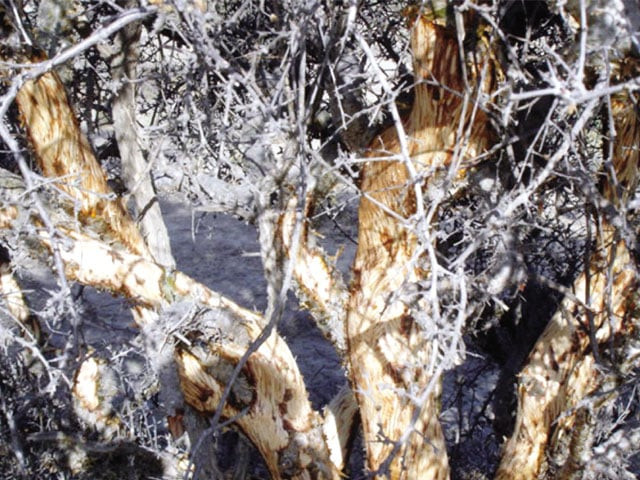Stealing from trees: Gum illegally extracted, transported to Karachi
Experts say conservators are ignoring the resources present in the area.

According to social workers and environmentalists, this illegal trade started back in the late nineties and since then it has continued with the ‘help’ of officials.
“The district administration has banned the chopping of trees and extracting gum under Section 144 but it was effective for just seven days and it ended by the time the notification actually reached,” says Bharumal, coordinator of the Society for Conservation and Protection of Environment (Scope).
None of the conservators of forests and wildlife in Nagarparkar Tehsil of Tharparkar district, one of the Ramsar (UN convention) sites, are able to monitor the trucks that transport illegally extracted gum (resin), allege the activists.
The Nagarparkar area used to have thousands of lush, green Gugral trees but now 70 per cent of them have dried up, says Salim Khoso, a journalist. “The Gugral tree, loved for its aroma during the rainy season, dries within six months after they extract its gum with the help of poisonous chemicals and by making cuts with axes.”
Since the tree bears gum in the winter, this season suits the traders who go to work in December and continue till April. “The gum, traditionally used in Jain and Hindu temples for its aromatic peculiarity, is also used in medicines, cement and manufacturing audio and video cassettes,” he explains.
The substance is sold in Karachi at rates ranging between Rs30,000 and Rs40,000 per 40 kilogrammes, which has made it a lucrative business for influential people living in the area.
Tanveer Arif, the CEO of Scope, also expresses concern and maintains that his organisation has been raising a voice against it different forums but in vain.
“These activities are harming biodiversity, which should be protected under the laws of the country,” he says. “If the Gugral trees continue to dry up at this pace, it would speed up desertification and ultimately, cause a natural calamity.”
Bharumal says Scope tried creating awareness about the importance of the Gugral among residents and even organised a colourful Rakhi Bandhan festival last year, during which hundreds of women tied Rakhis (strips of cloth) to the Gugral trees, declaring them ‘brothers’.
A number of non-government organisations had also formed an alliance to launch a struggle against the mafia involved in this trade. Tharparkar is one of the five famous eco-ranges of Pakistan but surprisingly, the Sindh Environment Protection Agency, forest and wildlife departments seem uninterested in saving this area, which was to be declared a national park, says Bharumal.
IUCN, an international organisation working for the environment, has enlisted the Gugral shrub, about four to six feet tall, in its Red Data List.
The Gugral tree in a 2-square kilometre area yields 100 to 120 maund (1 maund equals 40kg) of resin every week.
The tree usually releases resin in a small quantity but smugglers use chemicals extract it in bigger quantities.
Published in The Express Tribune, February 2nd, 2011.



















COMMENTS
Comments are moderated and generally will be posted if they are on-topic and not abusive.
For more information, please see our Comments FAQ